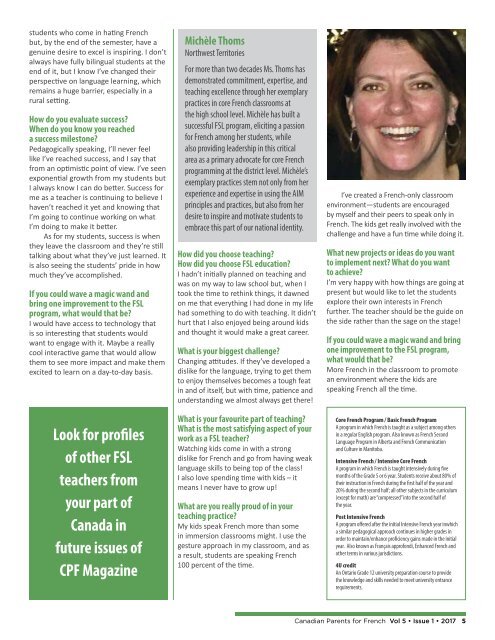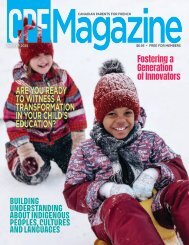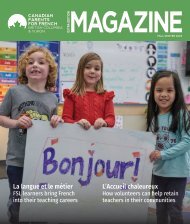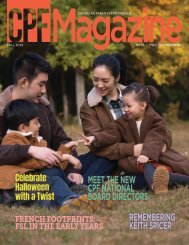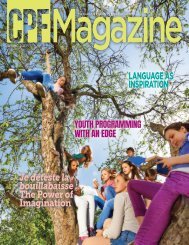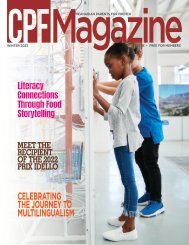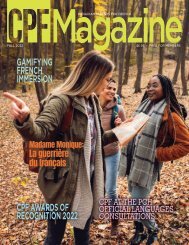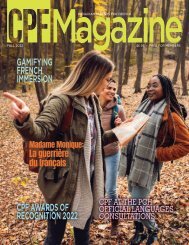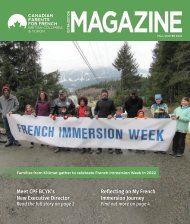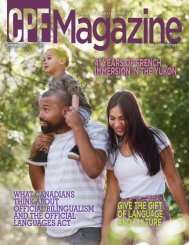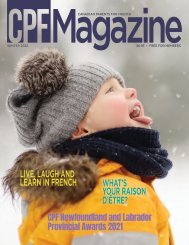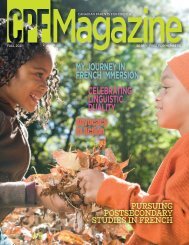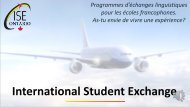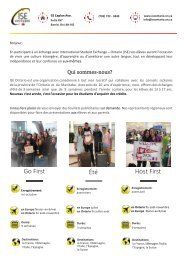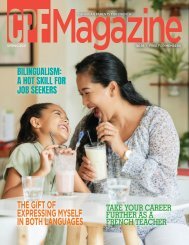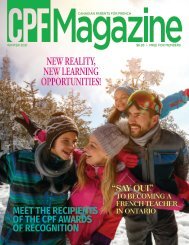CPFMagazine_FALL2017_Vol5Issue1_eVERSION
A national network of volunteers, parents and stakeholders who value French as an integral part of Canada. CPF Magazine is dedicated to the promotion and creation of French-second-language learning opportunities for young Canadians.
A national network of volunteers, parents and stakeholders who value French as an integral part of Canada. CPF Magazine is dedicated to the promotion and creation of French-second-language learning opportunities for young Canadians.
Create successful ePaper yourself
Turn your PDF publications into a flip-book with our unique Google optimized e-Paper software.
students who come in hating French<br />
but, by the end of the semester, have a<br />
genuine desire to excel is inspiring. I don’t<br />
always have fully bilingual students at the<br />
end of it, but I know I’ve changed their<br />
perspective on language learning, which<br />
remains a huge barrier, especially in a<br />
rural setting.<br />
How do you evaluate success?<br />
When do you know you reached<br />
a success milestone?<br />
Pedagogically speaking, I’ll never feel<br />
like I’ve reached success, and I say that<br />
from an optimistic point of view. I’ve seen<br />
exponential growth from my students but<br />
I always know I can do better. Success for<br />
me as a teacher is continuing to believe I<br />
haven’t reached it yet and knowing that<br />
I’m going to continue working on what<br />
I’m doing to make it better.<br />
As for my students, success is when<br />
they leave the classroom and they’re still<br />
talking about what they’ve just learned. It<br />
is also seeing the students’ pride in how<br />
much they’ve accomplished.<br />
If you could wave a magic wand and<br />
bring one improvement to the FSL<br />
program, what would that be?<br />
I would have access to technology that<br />
is so interesting that students would<br />
want to engage with it. Maybe a really<br />
cool interactive game that would allow<br />
them to see more impact and make them<br />
excited to learn on a day-to-day basis.<br />
Look for profiles<br />
of other FSL<br />
teachers from<br />
your part of<br />
Canada in<br />
future issues of<br />
CPF Magazine<br />
Michèle Thoms<br />
Northwest Territories<br />
For more than two decades Ms. Thoms has<br />
demonstrated commitment, expertise, and<br />
teaching excellence through her exemplary<br />
practices in core French classrooms at<br />
the high school level. Michèle has built a<br />
successful FSL program, eliciting a passion<br />
for French among her students, while<br />
also providing leadership in this critical<br />
area as a primary advocate for core French<br />
programming at the district level. Michèle’s<br />
exemplary practices stem not only from her<br />
experience and expertise in using the AIM<br />
principles and practices, but also from her<br />
desire to inspire and motivate students to<br />
embrace this part of our national identity.<br />
How did you choose teaching?<br />
How did you choose FSL education?<br />
I hadn’t initially planned on teaching and<br />
was on my way to law school but, when I<br />
took the time to rethink things, it dawned<br />
on me that everything I had done in my life<br />
had something to do with teaching. It didn’t<br />
hurt that I also enjoyed being around kids<br />
and thought it would make a great career.<br />
What is your biggest challenge?<br />
Changing attitudes. If they’ve developed a<br />
dislike for the language, trying to get them<br />
to enjoy themselves becomes a tough feat<br />
in and of itself, but with time, patience and<br />
understanding we almost always get there!<br />
What is your favourite part of teaching?<br />
What is the most satisfying aspect of your<br />
work as a FSL teacher?<br />
Watching kids come in with a strong<br />
dislike for French and go from having weak<br />
language skills to being top of the class!<br />
I also love spending time with kids – it<br />
means I never have to grow up!<br />
What are you really proud of in your<br />
teaching practice?<br />
My kids speak French more than some<br />
in immersion classrooms might. I use the<br />
gesture approach in my classroom, and as<br />
a result, students are speaking French<br />
100 percent of the time.<br />
I’ve created a French-only classroom<br />
environment—students are encouraged<br />
by myself and their peers to speak only in<br />
French. The kids get really involved with the<br />
challenge and have a fun time while doing it.<br />
What new projects or ideas do you want<br />
to implement next? What do you want<br />
to achieve?<br />
I’m very happy with how things are going at<br />
present but would like to let the students<br />
explore their own interests in French<br />
further. The teacher should be the guide on<br />
the side rather than the sage on the stage!<br />
If you could wave a magic wand and bring<br />
one improvement to the FSL program,<br />
what would that be?<br />
More French in the classroom to promote<br />
an environment where the kids are<br />
speaking French all the time.<br />
Core French Program / Basic French Program<br />
A program in which French is taught as a subject among others<br />
in a regular English program. Also known as French Second<br />
Language Program in Alberta and French Communication<br />
and Culture in Manitoba.<br />
Intensive French / Intensive Core French<br />
A program in which French is taught intensively during five<br />
months of the Grade 5 or 6 year. Students receive about 80% of<br />
their instruction in French during the first half of the year and<br />
20% during the second half; all other subjects in the curriculum<br />
(except for math) are “compressed” into the second half of<br />
the year.<br />
Post Intensive French<br />
A program offered after the initial Intensive French year inwhich<br />
a similar pedagogical approach continues in higher grades in<br />
order to maintain/enhance proficiency gains made in the initial<br />
year. Also known as Français approfondi, Enhanced French and<br />
other terms in various jurisdictions.<br />
4U credit<br />
An Ontario Grade 12 university preparation course to provide<br />
the knowledge and skills needed to meet university entrance<br />
requirements.<br />
Canadian Parents for French Vol 5 • Issue 1 • 2017 5


